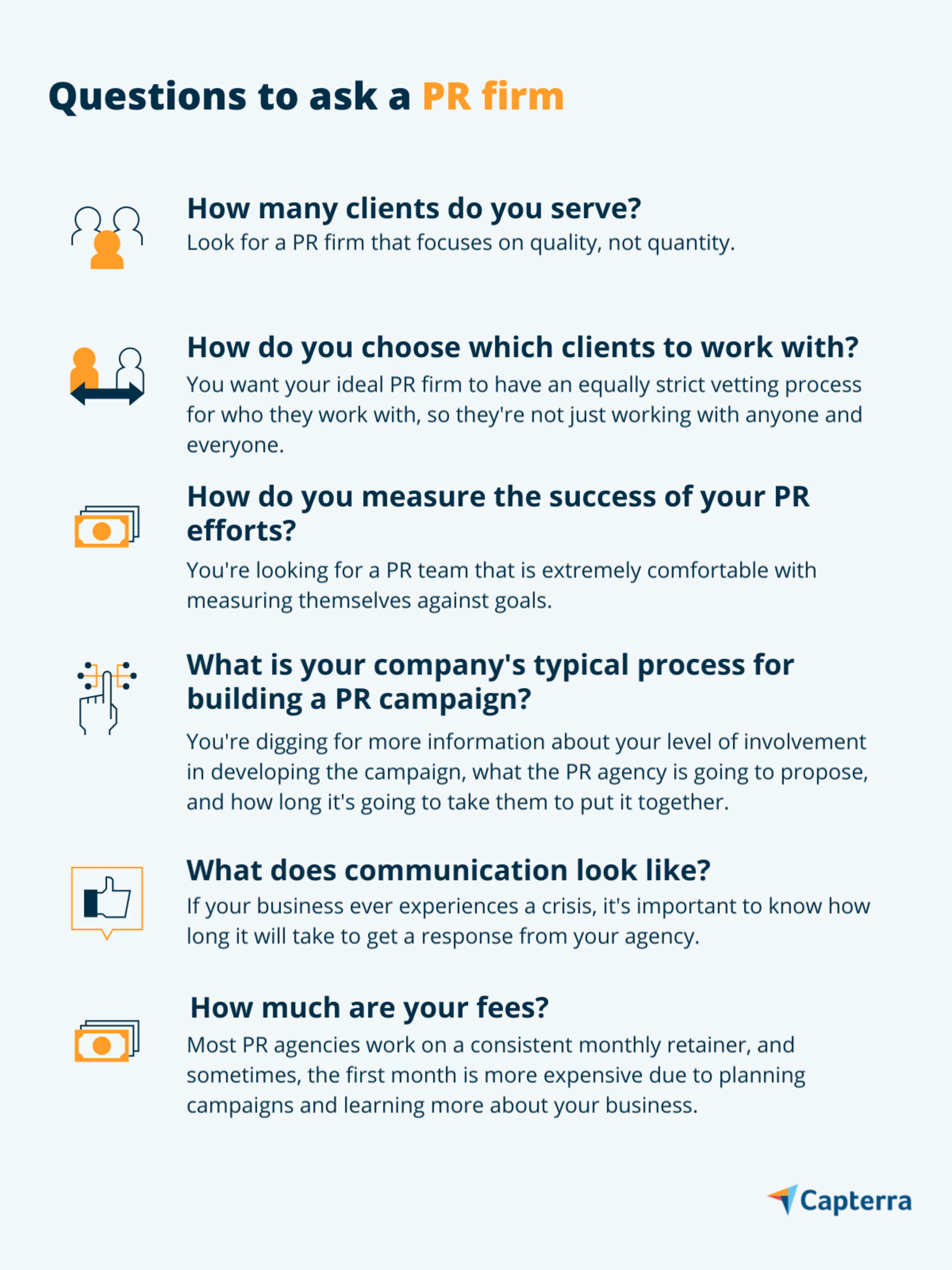Curious as to whether a PR agency is right for your needs?
Looking to hire a PR agency in the new year? For small-business owners and leaders, focusing on public relations (PR) helps build your brand and reach a wider audience. In a noisy, competitive landscape, it can be difficult to stand out amongst other small businesses and gain market traction with your ideal audience.
Also, you might be ready to share the news about a new product launch or service, generating new business revenue, or upselling current customers. With all of these momentum-building opportunities comes a chance for great PR, and you might want to outsource it to an expert.
Outsourcing PR to an expert agency is often cost-efficient and time-saving. PR is a highly specialized function that takes months to organically build and nurture relationships with the media. Even though you might have the expertise of a marketing professional in-house, 44% of businesses utilize service providers because the in-house marketing employees don't have a lot of bandwidth. PR is a full-time, fast-paced role that often must handle unexpected crises or situations.
So how do you choose a PR agency? Let’s go through questions to ask a PR firm and how to measure the impact of PR.
What is PR?
Public relations is a strategic communication process that builds mutually beneficial relationships between businesses and the customers they are trying to reach. Public relations services often include reputation management, crisis management, media relations, press release creation and distribution, media outreach, media training, copywriting, and market research.
The ultimate objective of PR is to build relationships with the media and influence customer opinions. It also aims to effectively manage and build your reputation with your target market by communicating key messages.
PR can make a huge difference in standing out among your target market, which is especially true for small businesses. PR aims to spread the word about your business, getting the right messages in front of the right customers at the right time. For example, your business might have a new goal to generate $10,000 in new monthly revenue. PR campaigns can help spread the word about new products or service offerings with a call to action to visit the product page on your website.
Businesses rely on agency partners to augment their internal communications and teams.[1] Outsourcing to an agency addresses skills gaps and specific market communication needs. It also provides a data-driven and independent perspective on internal and external brand communications.
How do you choose a PR agency?
When asking, "why should I hire a PR agency?," it's important to know PR is one of the more difficult marketing functions to keep in-house. PR professionals maintain constant, positive relationships with a roster of journalists at key media publications, and it takes a trained eye to know when and what messages to pitch out.
Define your unique business needs
PR agencies offer a variety of services, including marketing and advertising, so you'll want to narrow down exactly what your business needs. Medium monitoring, crisis management, social media management, media relations, or executive media training are just a few of the options PR agencies typically offer.
Research potential agencies
Once you know your business's unique needs and goals, it's time to research potential PR agencies. Start by asking colleagues and peers for recommendations, and if you're a local business, search for PR agencies specializing in your area.
Create a shortlist of agencies and get proposals
Once you have compiled a list of PR agencies, get in contact with them and request proposals. All PR agencies have a different proposal process, and it might take several weeks to get back to you. Make sure to build in plenty of time to thoroughly vet agencies and go through the proposal process.
Review the proposals and select an agency
Thoroughly review each proposal to select the right agency. Make sure you're comfortable with their KPIs, workforce, and communications plan. They should also have a deep understanding of your industry and subsequently, your business.
Tips on choosing a PR agency
You might discover a specific PR agency is way out of your budget, or maybe they specialize in crisis management, which you don't need. Don't be afraid to ask questions or even ask for a revised proposal once you see the PR firm's campaign plan and cost.
Questions to ask a PR firm
During the proposal and vetting process, dig into each aspect of the PR agency proposal, from their campaign plan to potential media outlets to any messaging and positioning they put together around your brand. Here are some sample questions to ask a PR agency:
How many clients do you serve?
Look for a PR firm that focuses on quality, not quantity. Having a smaller client roster often means they can focus more on individual clients, and your account won't be handed off to a junior representative.
How do you choose which clients to work with?
You want your ideal PR firm to have an equally strict vetting process for who they work with, so they're not just working with anyone and everyone. This also means that their media relations are incredibly important to them as they aren't reaching out to their journalist contacts about just anyone.
How do you measure the success of your PR efforts?
Accurate measurement is crucial to understanding the effectiveness of PR campaigns, and your PR agency should be a partner in holding themselves accountable. You're looking for a PR team that is extremely comfortable with measuring themselves against goals, whether that be sales, social media engagement, brand mentions, and more.
What is your company's typical process for building a PR campaign?
This question helps you understand what goes into building a PR campaign when you're working with this specific PR agency. Each agency will have its own unique strategy; some might need weeks for planning, and others might leave more flexibility in the PR plan.
Some agencies might want extensive executive face time for subject matter expert content production, and other PR agencies might be more hands-off, taking their own stab at drafting thought leadership pieces. With this question, you're digging for more information about your level of involvement in developing the campaign, what the PR agency is going to propose, and how long it's going to take them to put it together.
What does communication look like?
Especially in the fast-moving world of PR, you want to know you're going to receive a prompt response from your PR agency. If your business ever experiences a crisis or a real-time developing situation that you want to capitalize on, it's important to be aware of the communication flow and timeline when it comes to reaching out to your account manager.
How much are your fees?
Most PR agencies work on a consistent monthly retainer, and sometimes, the first month is more expensive as they bill for planning, time spent learning about your business, and preparation. It’s critical to ask your intended agency about what their rates are and any additional fees.
How do you measure the impact of a PR agency?
If you want to hire a PR agency, key performance indicators (KPIs) and other measurable goals gauge the success or failure of their work and campaigns. Here are a few different ways to measure the impact of your PR agency, depending on your industry or specific goals.
Sales stats
PR campaigns typically drive sales growth. While it's considered a top-of-funnel tool contributing to overall awareness, increased brand mentions and website visits can lead to an uptick in product sales. PR content can also drive referral website traffic from major media outlets, exposing new audiences to your brand and encouraging them to purchase.
Social media reach and engagement
Social media buzz is another way to measure the impact of PR campaigns. You can measure multiple social platforms or stick with one or two your brand is dominant on. PR campaigns should lead to an uptick in engagement with your community, and social media monitoring tools allow you to see fans, customers, and other audience members talking about your brand.
Media impressions
Tracking media impressions is one of the most traditional ways to measure PR success. Media coverage is typically quantified by multiplying the viewership numbers of a media outlet by the number of times your mention appeared. This calculation provides an estimation of the number of people who read or heard about your company.
Brand mentions
Along with media impressions, brand mentions are a traditional way to monitor who's talking about your brand through product reviews, blog posts, social media posts, publications, and more. Tracking brand mentions monitors the sentiment and conversation about your brand online.
Website traffic
Monitoring influxes of website traffic helps you understand how PR activities are influencing your online visibility, traffic, and engagement. Use urchin tracking module (UTM) parameters or web monitoring software to track PR campaigns and benchmark a baseline of daily web traffic before and after a campaign.
Content analysis
Analyzing the number of articles and consequent impressions is one way to track the success of your PR campaign. You can also measure if key brand messages are being mentioned and what publications your business is appearing in. For example, a brand mention about your rapid company growth in a publication such as TechCrunch might be worth more to you than a small mention about your founder in a local newspaper.
Market surveys
Surveys offer an excellent real-time snapshot of your audience's opinions and behaviors. It's helpful to measure the market on their perceptions about your brand before you begin any PR campaign, so in six to 12 months, you can remeasure the same audience to gauge any changes.
Market surveys also help create brand messaging and tone as your target audience tells you what resonates well with them. Market surveys also offer the opportunity to share a voice and perception against competitors and measure this as PR campaigns move forward.
Ready to hire a PR agency?
If you're ready to secure media coverage and reach your target market with strong, punchy communications, it might be time to hire one of the top PR agencies. Choosing the right PR agency for your business involves an in-depth process of defining your business's unique needs, researching agencies in your industry, and requesting proposals.
Make sure you're ready to ask potential PR firms questions about their client roster, measuring success, fees, and standard workflows and processes. We’ve included a list of our recommended questions below, so you can easily take them with you when interviewing PR agencies. To get started, reach out to peers in your industry to see if they have any recommendations.


